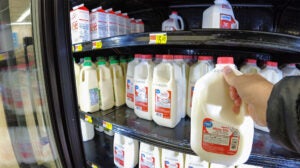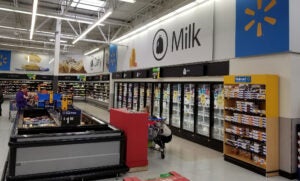Something big is on the horizon for Walmart and the dairy industry: The retail giant announced this fall that it plans to build a $350 million fluid milk processing facility in the southern Georgia city of Valdosta.
The plant, which would produce gallons and half gallons of white and chocolate milk under Walmart’s Great Value and Members Mark brands, is expected to provide milk to more than 750 Walmart and Sam’s Club stores. Operations should begin in late 2025.
I’m not sure how to feel about this. On one hand the big get bigger, and I wonder if this will hurt the region’s local milk processors. On the other hand, Walmart will be sourcing the milk from local dairy farms in Georgia as well as neighboring states like Florida. I know the families at many of these larger dairies in the area, and they are wonderful people. There are certainly opinions and arguments that can be made on both sides.

It sort of reminds me of a comment you hear every once in awhile that goes: “The good news is you have this … and the bad news is you have that.” The thing is, I haven’t come across a lot of long-term happy stories from vendors that supply Walmart. A couple of years ago, there was a mix of fanfare and concern over an Angus processing facility that Walmart was also opening in Georgia.
One news report about the beef facility explained, “Because the plant is owned by Walmart, which is working only with select suppliers — whittling a variety of Angus cattle into a specific breed and specific supply chain — most Angus ranchers … are likely to be shut out. It could also mean ranchers face stiffer competition elsewhere. If Walmart increasingly relies on its own supply and starts buying less commodity beef, that’s one fewer customer for others to sell to.”
Usually “bigger” can seem worse in these kinds of cases, especially with consolidation amplifying the supply chain issues during the height of the COVID-19 pandemic.
Georgia has become a very large dairy farm state, and rumor has it that $3,000 is being paid to Walmart for every job created. I don’t think we’ll hear a lot about how they could crush small, local dairy farmers with low prices after the plant is actually up and running. Once all the warm and fuzzy has worn off, many farmers don’t think it’ll be pretty.
Then there’s the logistics of packaging. What about all the places that currently produce milk cartons and jugs?
Dale McLellan and his son, Leon, are Florida-based dairy farmers who also have a milk processing facility.
“There’s milk plants in Florida, Louisiana, and other states that will definitely be hurt by it. The worst part of it that no one will be able to see the efficiencies of those milk plants. They’ll probably go away because you can’t run a plant that’s geared up to run x amount of gallons and then divided by two and expect it to show a profit,” Dale said. “I’m hopeful that it works out for everybody concerned. I don’t see how it can because that packaging is taking place somewhere now that’s going to get crushed.”
Leon added, “Walmart having control of local milk prices could be good as is bad. They put a lot dairy farmers out of business in Tennessee and so forth. I have a feeling it’ll have a negative effect on local dairy farms.”

Another perspective on the issue? A few years back, dairy farmer Krista Stauffer wrote a piece on AGDAILY being critical of folks boycotting Walmart milk because that milk still comes from family farms — and that kind of boycott hurts farms like hers.
“Just keep buying dairy products. It doesn’t matter if you buy directly from the farm or from the store. Every gallon of milk you buy, as well as your favorite cheese or ice cream, supports dairy farms. It supports family farms like mine,” Stauffer said.
Personally, the question I would like to ask Walmart is if they’ll be paying these farmers better than other companies and bringing better economic value to the industry. But considering they price themselves on being a “low cost leader,” I don’t have high hopes. And I’m sure most people’s knee jerk reaction will be negative. Society in general seems to be anti-“big corporation.”
Operations at the new facility should begin in late 2025. I’m keeping an open mind, and we’ll see …
Michelle Miller, the “Farm Babe,” is an internationally recognized keynote speaker, writer, and social media influencer and travels full time to advocate for agriculture. She comes from an Iowa-based row crop and livestock farming background and now resides on a timber farm in North Central Florida.



